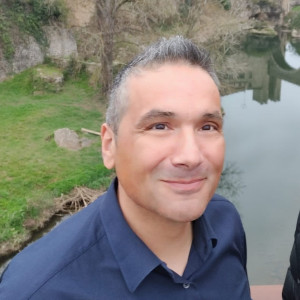Capítulos

Pasado simple: 'There was, there were'
Es la forma pasada de there is / there are.
| There was a chair | Había una silla |
| There were some chairs | Había unas sillas |
Al igual que en el presente simple usaremos 'there was' cuando el sustantivo al que acompaña es un sustantivo contable en singular o uno incontable y 'there were' con los sustantivos contables en plural.
Afirmativo
Hay que tener en cuenta que 'there was' y 'there were' no se puede contraer en la forma afirmativa.
Se forma con el pasado del verbo 'to be' en singular o plural, según corresponda.
| Afirmativo | ||
|---|---|---|
| singular | There was a bank | Había un banco |
| plural | There were some banks | Había algunos bancos |
Negativo
El negativo se forma poniendo el pasado del verbo 'to be' en forma negativa (there was not / there were not). Es frecuente el uso de la forma contraída (there wasn't / there weren't).
| Negativo | ||
|---|---|---|
| singular forma corta | There wasn't a shop | No había una tienda |
| plural forma corta | There weren't any shops | No había tiendas |
| singular forma larga | There was not a shop | No había una tienda |
| plural forma larga | There were not any shops | No había ninguna tienda |
Interrogativo
El interrogativo se forma con el verbo "to be" en pasado (was/were) seguido de "there".
Estas preguntas suelen responderse con la forma corta: "Yes, there was/were" o "No, there wasn't/weren't".
| Interrogativo | ||||
|---|---|---|---|---|
| singular | Was there a park there? | Yes, there was | ¿Había un parque allí? | Sí (si había) |
| No, there wasn't | No (no había) | |||
| plural | Were there any restaurants? | Yes, there were | ¿Había restaurantes? | Sí (si había) |
| No, there weren't | No (no había) | |||
Expresiones con there was
| Was there any point waiting? | ¿Tenía algún sentido esperar? |
| There was no point in waiting. | No tenía sentido esperar. |
| There was no point in crying. | No tenía sentido llorar. |
| There was no point in crying. | De nada servía llorar. |
| There was no need to go. | No había necesidad de ir. |
Ejercicios
Completa las siguientes oraciones con la forma adecuada de there was o there were.
____ a birthday cake.
Selecciona una respuesta.
____ a lot of people in New York.
Selecciona una respuesta.
____ music at their party?
Selecciona una respuesta.
____ any money in her wallet.
Selecciona una respuesta.
____ a music festival in your town?
Selecciona una respuesta.
____ any chocolate biscuits.
Selecciona una respuesta.
____ many children there.
Selecciona una respuesta.
____ twenty students in her class?
Selecciona una respuesta.
____ any wood chairs.
Selecciona una respuesta.
____ any men at the airport?
Selecciona una respuesta.
¿Buscas clases de ingles? Superprof es tu sitio.
Resumir con IA:













No entiendo por qué si hablo de vecinos no uso el áre
My neighbours. Are noisy y señala que es Is
Hola Gadi ¡Buena observación! Gracias por escribirnos.
En este ejercicio estamos practicando el pasado simple del verbo to be, por eso usamos was / were en lugar de is / are, que corresponden al presente.
Entonces, si te refieres a algo que ocurría antes, debes usar were (porque neighbours es plural).
De todas formas, no encontré el ejercicio que mencionas acerca de los neighbours. ¿Quizás era en otra sección de ejercicios?
Quedo atenta a tus comentarios.
Saludos.
estoy confundida con la pregunta 13 y 14
Hola Julia ¡Gracias por tu comentario!¿Podrías contarme exactamente qué parte no te queda clara? Así puedo explicártelo paso a paso y asegurarnos de que quede resuelto.
Saludos.
es confuso por lo siguiente la abuela viene siendo ella she por asi que se supone que tiene que ser isn’t lo mismo que uncle o tio es el de la misma manera isn’t,y en la 9 estas habalndo de la persona en priemra persona i am not at home por que es isn’t la respuesta, me puedes explicar por favor.
Hola ¡Muy buena pregunta! 😊
Lo que mencionas tiene sentido si estuviéramos hablando en presente, porque en ese caso usaríamos is / isn’t con she o he:
She isn’t at home.
He isn’t my uncle.
Pero en este ejercicio estamos trabajando el pasado simple del verbo to be, así que “is” cambia a “was” y “are” cambia a “were”.
Por eso:
She was not (wasn’t) at home. → Ella no estaba en casa.
He was not (wasn’t) my uncle. → Él no era mi tío.
I was not (wasn’t) at home. → Yo no estaba en casa.
En resumen:
✅ Presente → am / is / are
✅ Pasado → was / were
Así que no es “isn’t” porque estamos hablando del pasado, no del presente.
Quedo atenta si es que no quedó claro o si es que tienes cualquier otra pregunta. ¡Que tengas muy buen día!
Saludos.
• The verb to be is one of the most important in English because it allows us to express identity, age, profession, nationality, state, and place.
• It is an irregular verb, so its forms change depending on the subject (am, is, are in the present; was, were in the past).
• It is essential to master its affirmative, negative, and interrogative forms in order to build sentences correctly.
¡Hola Diana! Muchas gracias por avisar y disculpa por las molestias que esto te haya causado.
Revisamos el sistema y debería estar funcionando correctamente.
¡Gracias por tu paciencia y comprensión! 😊
Saludos.